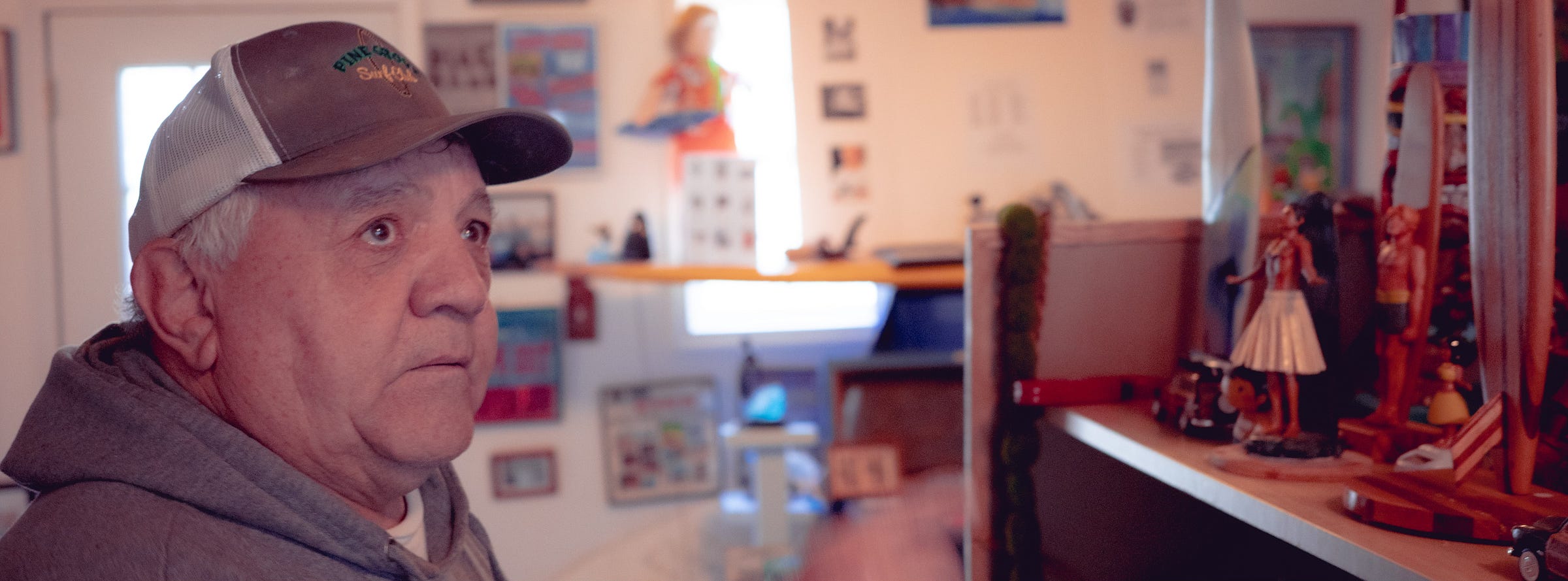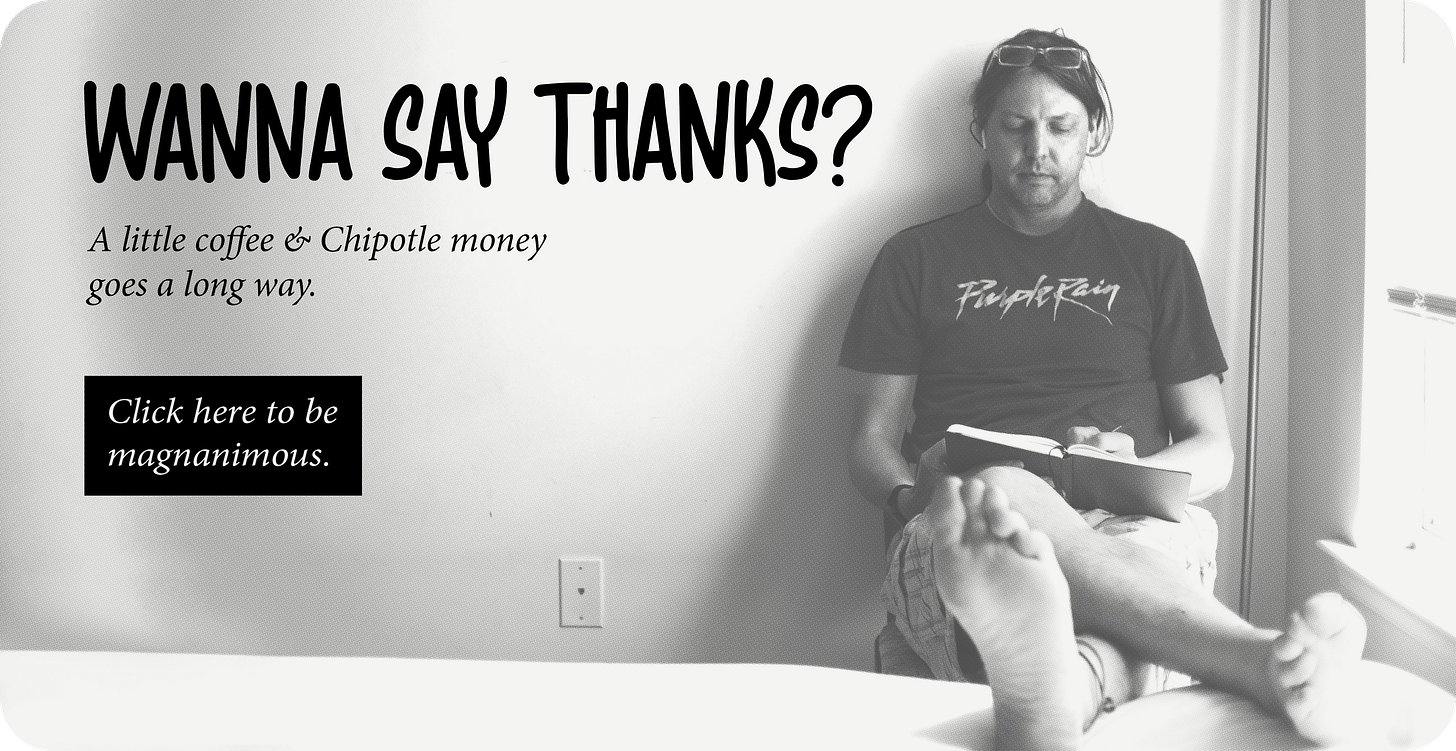Shredding the gnar through our deadly new lifestyle
Bruce “Snake” Gabrielson taught me a lesson he didn’t intend, but one he’d probably agree with. Now it’s my turn to pass it on.
The Bruce “Snake” Gabrielson Surf Art Gallery and Museum is the raddest museum experience I ever had. Also the weirdest.
It’s open most days, and there’s no admission cost but it’s by appointment only. “Often closed when the surf is good so call ahead,” the website explains. So I called.
The man, the Huntington Beach Snake himself, answered. I asked about the museum, not sure I had the right number. But it was him and he said he could fit us in.
“Like, today?”
“Yep, c’mon over in about an hour.”
So we went.
What followed was a tour of the most amazing collection of surfing memorabilia I will ever have the pleasure of seeing. I’ve never surfed a day in my life, but the experience left a heavy impression. You’d have to see it to understand.
I mention it because it’s relevant to the social outbreak we have on our hands. The one you can feel yourself in, same as me. The one we’ve been neck deep in for some years now. It came fast and caught us off guard—which is why it doesn’t yet have a name. The description in the title above—“deadly new lifestyle”—is as close as we’ve gotten. It’s Ted Gioia’s, who wrote about it here.
I won’t retread his ground, except to say that I dare you to read his 18 indicators and see if you don’t identify with at least half of them. For added context, I’d also suggest checking out Bowling Alone and The Vanishing Neighbor. Pick any microscope from which you’d prefer to study the contagion; the symptoms are the same across national and cultural boundaries. We’re experiencing less, both socially and empirically. We’re not connected to the world or each other anymore. And we know it’s a problem, if public reaction to Apple’s recent ad is any indication. We’re starting to learn that convenience can cheapen our experiences.
So what do we do about it?
I think Snake has the answer. I think we should all go surfing.
Maybe not literally. I mean if you can and you’d like to, excellent; I’d posit that surfing is the most robust antidote to this unnamed epidemic. But let’s unpack why so that those of us who are landlocked or can’t afford J racks on our cars can find our own escape from the problem.
Paddling out
What makes surfing so good for us?
1. Surfing is physical. It requires a base level of physical fitness a lot of us in the greying contingent might find challenging. It also takes place in physical reality—no technological abstractions or dopamine games.
2. Surfing is social. Surfers meet other surfers out there. They get to know one another and interact in person, not just online.
3. It’s non-ego. Yes, any sport will have its personalities. But you have to shed that ego to perform at your best.
4. Surfing is environmental. It must be done outside, with nature’s help.
5. Surfing is emotional. It causes intense feelings of calm, excitement, challenge, and achievement.
6. Surfing is tribal. Participants gain a sense of group identity and pride in the tribe they're a part of. Yes, I realize tribes can go too far, but the lesson there is that tribes are a necessary part of our social health. If we’re not deliberate about which ones we join, we will join others—and they may not be good for us.
7. Surfing is temporal. You gotta know when to go out, when the tides are, when the weather will hold or turn, when to pick the right wave, when to drop in, when to cut, etc. To surf is to have an intimate relationship with time and timing. But it also makes you forget time and place.
8. Surfing is spiritual. It leads to a oneness with nature. Through surfing, you can get a sense of your place among the waves, the tides, the earth and the universe.
9. Surfing is ritualistic. For an activity that’s forever embedded in time and place, surfing provides plenty of transcendence. Practitioners use their mind, body and spirit to participate with eternity and chase the infinite potential of their souls. There’s nothing to download.
10. It’s creative and expressive. Couple this with the other nine and you have an ideal Flow State activity on your hands.
Surfing is what I’d call a “full-spectrum experience.” A fully balanced diet for the soul.
Further, I put it to you that our day-to-day experiences, which deprive us of so much on this list, contribute directly to this deadly new lifestyle.
Riding mush
A lot of us work on laptops for a living. Is this a physical activity? Hardly. And “beige cubicle” might just be the diametric counterpart to “environmental.” Using the full-spectrum scale above, most office routines rank at a generous 2.3 out of 10 and that’s if you like your co-workers.
The problem is that work costs you 43 hours of your week if you’re on track with national averages. More than a third of your waking hours committed to an activity that pays in cash, not spiritual nourishment.
What about commuting? That’s another 7 to 8 hours for the most of us, a full working day per week caged inside our cars or glued to our headphones. For most of us, the experience is about as social as a DMV visit and precisely as soulful. 1.5 out of 10 if you ride a bike.
Social media’s even worse. Here in the U.S., we’re doomscrolling at a rate of roughly 17 hours a week. Yes, the platforms are tribal, but not in a good way. And non-ego? Hilarious. 3.5 out of 10 on a good day not in an election year.
How about streaming? Slightly higher than social media, we spend about 20 hours a week binge-watching. Not physical, environmental or spiritual experiences by any measure. Sure, it’s nice to kick back and wind down in the evenings but the tube’s still only giving us a 4 out of 10 on the full-spectrum scale.
We could go on, but of the 112 total waking hours we have throughout the week, we’re already blowing 80% of them on experiential garbage. No activity is even half as fulfilling as it could be. We’re distracting ourselves to death.
Chasing the stoke
As for what to do about this, my proposal to you is two-fold:
First, find ways to up the scale for activities we can’t avoid. For commuting, you’ll notice I brought up biking. If that’s not an option, maybe try carpooling or getting to know your fellow commuters. Or maybe start a ritual—something as small as planned coffee breaks with a colleague each day. Tell ‘em you’re brainstorming efficiencies or whatever gets the Micromanaging Man off your back, this stuff is important.
Second, start to get very serious about the hours you spend outside of these non-negotiables. Spend them wisely, as if your life depends on it. Because it does.
Feeling socially adrift? Maybe it’s time to join a community group or garden club—anything to get you seeing people in person on the regular. Or maybe pursue spiritual activities, which can be anything from “touching grass” as the kids say to church or motorcycle maintenance. There’s more at our disposal than we might think.
Start reading the lineup
Progress is getting funny on us. When the iPod first came out, it seemed extraordinary. “1,000 songs in my pocket? Hell yes, sign me up!”
What the commercials didn’t say was that signing up meant opting out. No one told me that my friends and I would no longer be swapping albums like we did with tapes and CDs. That my car’s cupholder would now house a nondescript metal card instead of physical artifacts of my musical education journey. That I’d stop going to music stores. That Spotify would put those stores out of business. That Spotify would work on leveraging AI against musicians to put them out of business, too. No one told me what I was forfeiting, and I’ll admit I wasn’t ready.
So okay, technology, credit where due. You’ve had us all going for awhile now, but no more. It’s time we started making much more deliberate choices. To become skeptical of convenience, ease and innovation. To adopt elements of progress only when they don’t force unhealthy compromises. It’s time to actively choose relationships and experiences because thanks to technology, those things are no longer guaranteed.
We’re all going to have to find our own ways to surf.








Great article, James. Love the ideas for reconnecting with other humans and nature and the related reading recommendations.
I recently returned from a short vacation in Cancun with a relative. The first thing most people asked when I got back was not if I had a good time or what I did, but if I got lots of good pictures. No, I didn't, because I didn't bring my phone to most places we went. I wanted to be fully present in the moment and have no distractions. Everything I needed was already there.
Now, I understand that it's nice to take photos for the purpose of reminiscing about your experience years later, but I get the impression that's not why most of my peers asked about photos. I think their minds were more on taking vacation photos for the sake of having something newsworthy to post on social media. I wish our society would re-normalize not sharing every event or place we go online.
Culture is going to figure out what it means to be alive in a meaningful way rather than an efficient way.